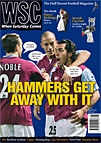 Twenty years ago, unfancied teams won the Scottish and English Cups then agreed to a home-and-away Battle of Britain. But, as Neville Hadsley recalls, Coventry and St Mirren only met the once
Twenty years ago, unfancied teams won the Scottish and English Cups then agreed to a home-and-away Battle of Britain. But, as Neville Hadsley recalls, Coventry and St Mirren only met the once
Dedicated fans can be very patient awaiting the next instalment of a long-running saga. Star Wars aficionados endured a 16-year gap between movies, yet there was no rioting on the streets of Beverly Hills. Similarly, followers of the whip-carrying archaeological looter Indiana Jones who silently long for more will be rewarded with another instalment in 2008 after a 19-year hiatus.
Hope persists, then, for supporters of Coventry City and St Mirren that, one day, the destination of the much prized and sadly overlooked Anglo-Scottish Challenge trophy can finally be settled once and for all.
Almost 20 years have passed and we still do not know the result. The first leg took place at Highfield Road on December 22, 1987, but since then, nothing. The suspense, among both sets of fans, must be killing.
The year 1987 was a fine one for utterly pointless cup competitions. With the exclusion of English clubs from Europe after Heysel, the authorities looked in panic for ways to fill the gaping gaps in clubs’ fixture lists and bank balances. One “solution” was the Simod Cup, perhaps the most outstanding competition in the great pantheon of useless trophies, which began in 1987 and stumbled on like a drunk until, under the name of the Zenith Data Systems Cup, it finally collapsed in 1993.
Another was the Anglo-Scottish Challenge. The idea – a revival of a competition first staged in 1959 – was to pit the Scottish and English FA Cup winners against each other in a two-legged final.
St Mirren were the first winners of the Anglo-Scottish Challenge in 1959, beating Nottingham Forest 5-4 on aggregate after a 3-2 win at the City Ground in the first leg. Such was the excitement the idea generated, 20,000 turned out for the return leg at Love Street to witness a home triumph. The Challenge was revived in 1987 but, sadly, never came close to generating a similar interest. With Coventry barred from the Cup‑Winners Cup, their motivation was obvious. What possessed the Scottish Cup winners to agree – possibly a desire to relive the triumph of 1959 and to see the Lady Godiva statue and the Peeping Tom clock at first hand – is not clear.
Scheduling the first leg on a Tuesday three days before Christmas probably wasn’t the best way to boost the competition’s credibility, however. As a result only 5,331 hardy souls, including, as it happens, Brian Clough and Kenny Dalglish, turned up. Not that the evening was without pomp. Somewhat theatrically, the captains – the Sky Blues’ Trevor Peake and the Saints’ Campbell Money – led out their teams brandishing their respective trophies, in the manner of boxers bringing their title belts into the ring. Would it be winner takes all? We never found out.
Perhaps it was the match itself that put the competition in limbo. Although Coventry manager John Sillett and his counterpart Alex Smith had promised a competitive game, the occasion had more of a friendly feel about it. The Sky Blues took the lead after 28 minutes when David Phillips was first to the rebound after Dave Bennett’s shot was saved by Money. Goals galore had been forecast by Sillett, but, just after the hour – not long after the City manager took off two of his most effective performers, Peake and David Speedie – Saints equalised. Billy Davies, now Derby manager, set up sub Kenny McDowell, who hammered home to end the scoring for the night – and the fixture.
The return was fixed for March 22 the following year, but so underwhelming was the first instalment, the sequel never materialised. The feeling was that there was little interest in completing the fixture, although, according to former Coventry secretary Graham Hover, the problem was more about cash. The clubs failed to get a sponsor and without one it would have been a loss-maker. Whatever the reason, there have yet to be demonstrations, either in Paisley or in Coventry, calling for the fixture to be concluded, despite the delicate balance of the result and the obvious chance for one of two success-starved clubs to claim a trophy.
Some Saints fans already claim victory – on away goals. But until Love Street throbs once again with cross-border anticipation, the matter will remain a quiz question for hard-core football-fact collectors.
Perhaps, like Star Wars, the saga will one day continue. Until then the trophy will continue to gather dust, just waiting for Indiana Jones to rescue it.
From WSC 246 August 2007